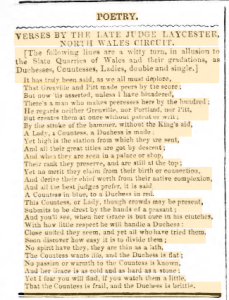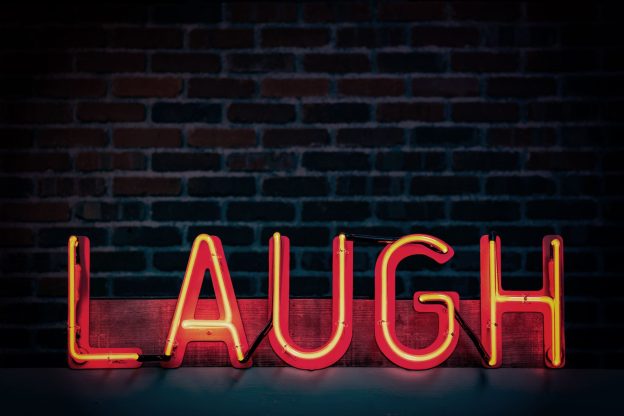A few years ago, I wrote a paper about reports, in the medieval Year Books, of humour, jokes, laughter and levity in court.[i] Although I have never had ambitions to ‘do comedy’ myself (probably a good thing, as those who have been subjected to my attempts to liven up Land Law teaching will attest) I do find humour fascinating as well as enjoyable. Maybe it began when, as an impressionable and angsty teenager learning French, I came across a line in a Georges Brassens song, Le Vieux Léon, about people masking their sadness with jokes and laughter – some old friends, broken-heartedly (le coeur serré) following a coffin, laughing and joking around so as to pretend not to be crying ( en rigolant, pour faire semblant de ne pas pleurer). It has stayed with me all these years, along with the idea of the use of humour and laughter for various purposes other than pure enjoyment. Additional layers were added to this interest, once I got involved with research in law and history, and saw the references to laughter and smiles and jokes and so on in the Year Books, and suggestions in various translations that certain passages were intended to be humorous. Out of that came the humour paper, which allowed me to work through various ideas about the use of humour in court – real or imagined. There are examples of ‘clubby’ humour (strengthening bonds between the members of the common law legal profession, perhaps by picking on outsiders of some sort), and of slightly bullying humour (judges being rude about those pleading before them) as well as occasional obvious and rather charming delight in words and word-play, and perhaps genuine smiles and laughter.
Perhaps that paper should have got it out of my system, but I do still find myself looking out for, and noting examples of humour in court, wherever they come up. Recently, I have found myself drawn to reports of humour in court from a very different time and source: journalistic reports of the late nineteenth and early twentieth centuries. Those of us lucky enough to have a university affiliation can often get access to extensive databases of newspapers, but everyone with a computer and internet connection can look at the fabulous Welsh Newspaper Archive to get a flavour of these reports.
The headline (see how on-theme I am …) is that it is not at all uncommon to see reports which note laughter or ‘humorous’ exchanges or remarks in court, occasionally also the court being ‘convulsed’ at the hilarity of it all.[ii] Very few of them would strike a modern reader as being particularly funny, and some certainly make me annoyed or uncomfortable on behalf of the butt of the jokes. Still, there is some interest here, both in terms of what might have been going on in court (we cannot, surely, assume that the reports are complete nonsense) and also in terms of the ideas and attitudes which are reflected in the reports, and the reporting, of such instances.
Some such reports might be categorised as the humour of sycophancy – with both the conversation in court (assuming it happened) and the fact of reporting giving a judge a chance to display his marvellous wit. We might see this in a report from the Evening Express of 29th November 1906 in which we are told of the humorous remarks of Darling J, in an aside about the letters sent to him by ‘lunatics’.[iii] The stage direction ‘Laughter’ is included six times in a short report in playscript form (shades of the Year Books …). It was just as well that a story from 1898 was headed ‘A Funny Judge’, because the reported exchanges between judge (here, Kekewich J) and lawyers, about getting married, were … not obviously amusing.[iv]
At other times, the apparently humorous exchanges recorded involve interactions with non-lawyers, very often people of a lower social status than lawyers. Sometimes, there is an attempt to show judges getting on with their inferiors, as in some judge-cabby banter in a case of 1897,[v] and the ‘banter with recidivist’ reports, which makes the whole process seem a bit cosy, and the judge a good sort.[vi] More often, we are generally being encouraged to laugh at these lowly laypersons. There was the ‘big rough man’ who dropped himself right in it by saying he had stolen a broom, innocently. Ho ho – working class people are stupid![vii] And they lack taste – like the silly woman who thought Brighton, Broadstairs and Southend were ‘fashionable resorts’ – how we laughed![viii] There was the man who couldn’t say ‘sciatica’ Hahaha!; and another exasperated at being unable to find a tenancy.[ix] Women, surprise, surprise, are another group of ‘others’ regularly mocked. There is gender-based humour in a situation in which a judge has to deal with allegedly defective corsets, in a civil case. The very idea! Cue much blushing from the ladies, and laughter.[x] Poking fun and ‘tittering’ at a defendant’s incongruous name (a Newport man, William John Heaven, who had been convicted of being D & D and assaulting a constable) certainly seems very unprofessional and inappropriate.[xi]
The most protracted account of ‘banter’ is in an earlier report of a low level land case in Ireland, with much literary and other pontificating, between lawyers and a witness, with the judge laughing too, during the discussion of wigs and phrenology and all sorts. I am not sure how much of it to believe.[xii] Possibly the weakest joke I have seen is from a QC sitting in judgment in 1898, in Clerkenwell County Court – examining a party who said he was a journeyman, HHJ Edge QC asked where the man was going [Groan!]
Particularly jarring across the years is the inclusion of ‘humorous’ reports when the subject matter of the case would seem to the modern reader to be anything but funny. Mental illness or alcoholism,[xiii] deafness,[xiv] domestic cruelty,[xv] child support,[xvi] the death of a child,[xvii] The one which seems hardest to understand (both in terms of goings-on in the case, and in reporting) is the report concerning an inquest in Southwark in 1899.[xviii] The newspaper report sets the scene of a mother attending the inquest, and being examined by the coroner about ‘her deceased child’. The coroner mocked her for the length of the girl’s name, and a juror joined in, causing laughter. Men teasing and laughing at the mother of a recently deceased daughter. Certainly challenges my abilities to understand the people of the past.
Those, then are a few thoughts on this fascinating (if not entertaining as such) subject. I expect I will be back to it from time to time, as I find further examples. At the moment I am wondering when this sort of reporting came to an end – because, dreadful as they are at times, modern British tabloids do not have such reports. When did the new solemnity start? Not even something like the Wagatha Christie trial generated reports of hilarity in court. It would be very interesting to pinpoint that change.
I would like to end with what seems to be a much more pleasant account of the matter of laughter, from a case in 1904. The Weekly Mail of 17th December 1904 reported a case in a London police court, before a magistrate, Plowden. An unnamed ‘young man’ was up before the magistrate for ‘disorderly conduct’ – a vague category of offence, but apparently not one that Plowden considered sufficiently wide to embrace loud laughter and ‘larking’ with a young woman in Ladbroke Grove. The constable who had arrested the defendant thought that this amounted to disorder because it took place at 1.30 and in a ‘respectable neighbourhood’. Plowden asked the fairly deep question of whether a neighbourhood could be altered by laughter, and proceeded to tease the constable about whether or not he ever laughed (OK, I expect there is some pleb-bashing going on there … the constable is likely to have been at a lower social position than the magistrate). It did end rather nicely, with the magistrate saying to the prisoner, as he discharged him …
‘Laugh as long as you can in this world!’
GS
8/10/2022
[i] ‘Et Subridet etc.’: smiles, laughter and levity in the medieval Year Books — University of Bristol
[ii] See this from 1915.
[iii] ‘Lunatics’ Letters to Judges’
[iv] Evening Express 17th November 1898
For more of Kekewich J’s humorous adventures, see this from 1897.
[v] This.
[vi] See, e.g. this one from 1910.
[vii] 1898.
[viii] 1908 – and I do wonder how this played with a Welsh readership. Did they like to hear about London lawyers being snotty about British resorts?
[ix] 1900.
[x] 1899.
[xi] See this from 1910.
[xii] 1852.
[xiii] 1903.
[xiv] 1909.
[xv] See, e.g. ‘A Collier’s Appetite’, Evening Express, 8th September 1900 and this from 1909. An assault allegation from 1900. And this, in which laughter is directed against married women in an especially pointed way.
[xvi] 1908.
[xvii] Evening Express, 13th September, 1899.
[xviii] ‘A Study in Nomenclature’, Evening Express, 13th September, 1899.
Photo by Tim Mossholder on Unsplash


